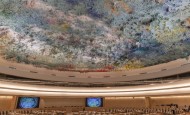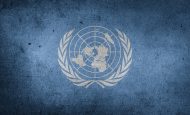NGO Monitor Sends Letter to UNHRC President Requesting to Convene Assessment of COI Mandate
Full Article
Click Here for Full Letter
Your Excellency,
We are an Israeli NGO and a project of the Institute for NGO Research (the “Institute”), an NGO in special consultative status with UN ECOSOC since 2013. We write with regards to the public hearings of the Commission of Inquiry on the Occupied Palestinian Territory, including East Jerusalem, and Israel (“COI” or “Commission”) that took place in Geneva from 7-11 November, focusing on inter alia the Israeli government’s designation of seven Palestinian NGOs for their affiliations with the Popular Front for the Liberation of Palestine (PFLP), a designated terrorist organization by the US, EU, Canada, Israel, and others.1
Pursuant to Council Resolutions 5/1 and 5/2, your Excellency has the authority for “review, rationalisation, or improvement” of special procedures’ mandates.2 Commission Chair Navi Pillay confirmed this authority during her 27 October remarks to the Third Committee of the General Assembly, noting that the “President of the Human Rights Council is the proper authority to clear up criticism of the mandate and clear up criticism of those he selected for appointment as commissioners.”3 Due to the significant concerns arising yet again regarding the COI’s methodology, we request that Your Excellency exercise your authority as President and initiate an assessment of the mandate of the COI and its ongoing lack of adherence to UN rules and codes of conduct.4
As detailed in a 24 August letter addressed to your Excellency, authored on behalf of the Institute by Barrister Joshua Kern and Anne Herzberg, the COI had been in breach of its duties of impartiality and non-discrimination; its duty to investigate inculpatory and exculpatory material equally, and investigate even-handedly; and its duty of transparency.5 These violations have continued and were blatantly manifest during the hearings of 7-11 November.
As opposed to a systematic fact-finding process carried out in accordance with UN rules and procedures, the hearings clearly reflect a highly manipulated attempt to create a tendentious record endorsed by the UN, and to be used to distort the evidence and silence legitimate criticism and debate. The hearings were announced (on 1 November) less than a week prior to their commencement,6 and the only groups chosen by the COI to participate were those that would support the COI’s apparently predetermined conclusions and would deny the overwhelming evidence of links between the NGOs and the PFLP. Those with dissenting viewpoints or concrete evidence (such as NGO Monitor) were unwelcome and not invited to appear.
In this regard, on 7 November, Ms. Pillay made the following remarks at the hearings, which raise additional concerns about the COI’s lack of transparency, irregular evidence collection methods,7 and the unusual arrangement of the hearings:
I want to make clear and place on record that this commission has invited submissions from all parties and from states. There are states who are sitting with documentary evidence or information about these seven NGOs who have been designated terrorist organizations. So we stand ready to receive the information from states. We stand ready to hear submissions or to hear alternate voices. In the absence of alternate voices challenging what we have heard today, we do not have any source that is a genuine challenge to the truth of what we’ve heard from the NGOs.
In contrast to these remarks, the call for submissions relating to designations of PFLP-affiliated NGOs appears to have been first issued by the Commission on 1 November, the same day the notice of the hearings was initially publicized, with a deadline for written submissions of 31 December.8 No specific information was provided regarding the public hearings, merely a cursory description of the topics and the times they were taking place.9 Details on how to appear before the Commission during the hearings were not included. Moreover, the names of those who would participate on 7 November were not made public until just prior to their commencement at 15:00 Geneva time. The names of the witnesses for subsequent days were released only a couple hours prior to their appearance. It is clear, however, that the topic of the hearings, the list of invitees, and most likely travel arrangements were made well in advance of the 1 November announcement. It is apparent the COI was seeking to prevent any ability to challenge or criticize the prepared narrative highlighted in the hearings.
It is therefore improper for Ms. Pillay to proclaim, “In the absence of alternate voices challenging what we have heard today, we do not have any source that is a genuine challenge to the truth of what we’ve heard from the NGOs.” This premature declaration, made
well before the deadline for written submissions, is yet another indication that rather than engaging in a credible fact-finding process, the COI has already formed pre-determined judgements and is simply marshalling “evidence” to fit these conclusions. Such actions are a violation of UN rules and fact-finding requirements.
We are further concerned by Ms. Pillay’s claim that “we stand ready to hear submissions or to hear alternate voices ….” Again, the COI only provided a last minute announcement of the hearings and provided no information as to how “alternate voices” (or any voices) could participate. As far as we are aware, the COI did not consult with or invite any “alternate voices.” The family of 17-year old Rena Shnerb, murdered in 2019 by several PFLP operatives simultaneously employed at some of the designated NGOs, as admitted by the PFLP itself, was to our knowledge not contacted or invited.
The claim that the COI does not have any “source that is a genuine challenge” to its apparent predeterminations is not based on an absence of evidence, but rather the failure to engage in any genuine effort to gather such readily available information. Since 2007, based solely on open source information, NGO Monitor has been documenting the extensive ties between a network of Palestinian NGOs and the PFLP.10 Our fully sourced and independently verifiable research alerted the international community to this disturbing phenomenon, and our work in this area is well-known, and available on our website.11 Had the Commission wished to comprehensively and accurately investigate this matter, as required by the COI’s Mandate and UN regulations, it should have consulted with our organization and asked us to participate in the hearings.
In addition, based on a review of the UN WebTV video and corresponding transcript, at the hearings, representatives from three of the seven NGOs who appeared at the hearings used them as a platform to defame NGO Monitor in retaliation for its role in exposing the aforementioned terror links. In particular, Addameer, Health Work Committees, and a lawyer representing Al-Haq (Michael Sfard) – as well as Commission member Miloon Kothari (potentially also in retaliation for a complaint we filed following egregious antisemitic remarks made by him in July 2022) – accused NGO Monitor of being behind a “smear campaign” against these organizations and of fabricating evidence. The failure to approach our organization is all the more notable, given the multiple false and defamatory claims made at the hearings.
To be sure, clear evidence of the links between the PFLP terror organization and the NGO network are readily available through open sources. Attempts to discredit and divert attention from NGO Monitor’s detailed research and analysis cannot erase this evidence.
The multiple procedural and ethical violations committed by the COI and evident at the hearings, as well as several disturbing and questionable claims made by Commission members at the 27 October Third Committee presentation, suggest, again, that your
Excellency must take immediate measures to convene a re-assessment of the COI’s mandate.
We respectfully request the opportunity to meet with you to discuss these matters in greater detail. We look forward to hearing from you.
Sincerely,
Gerald Steinberg
President, NGO Monitor
cc HE Volker Turk, UN High Commissioner for Human Rights
Footnotes
- https://www.ohchr.org/en/press-releases/2022/11/commission-inquiry-occupied-palestinian-territoryincluding-east-jerusalem.
- UNHRC Resolution 5/1, Annex, Art 54.
- https://media.un.org/en/asset/k1u/k1ukq81w1h
- A/HRC/50/21
- https://www.ngo-monitor.org/nm/wp-content/uploads/2022/08/220824_Letter-from-Joshua-Kern-andAnne-Herzberg-to-President-of-the-Human-Rights-Council-and-Annexes-1.pdf
- https://www.ohchr.org/en/press-releases/2022/11/commission-inquiry-occupied-palestinian-territoryincluding-east-jerusalem
- https://www.ngo-monitor.org/nm/wp-content/uploads/2022/08/220824_Letter-from-Joshua-Kern-andAnne-Herzberg-to-President-of-the-Human-Rights-Council-and-Annexes-1.pdf
- https://www.ohchr.org/en/hr-bodies/hrc/co-israel/index
- https://www.ohchr.org/en/press-releases/2022/11/commission-inquiry-occupied-palestinian-territoryincluding-east-jerusalem
- https://www.ngo-monitor.org/reports/hrw_fidh_omct_statement_on_ngo_official_linked_to_terror_group/.
- https://www.ngo-monitor.org/key-issues/ngo-links-to-terror-groups/introduction/


